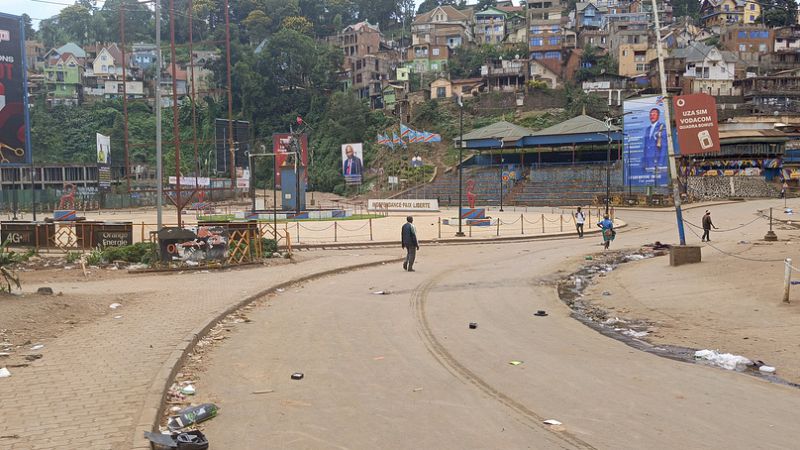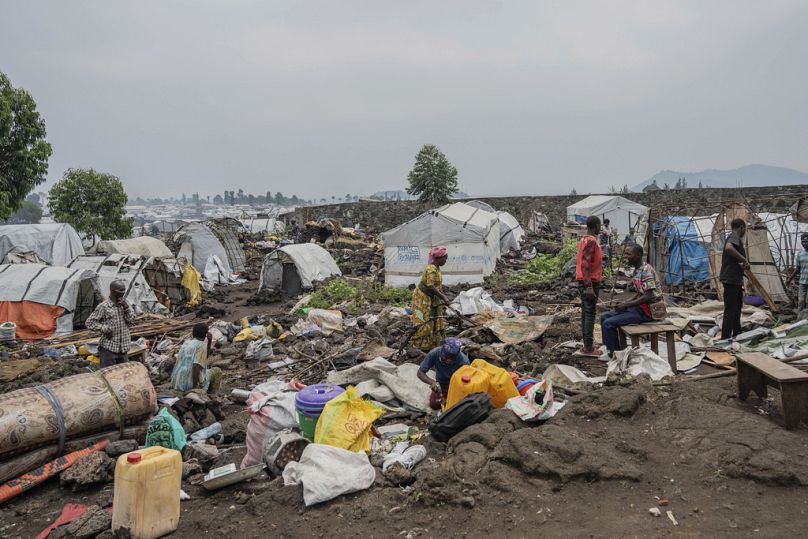Rwandan-backed rebels enter key city in eastern DR Congo

Rwanda-backed rebels reached the centre of eastern DR Congo’s second largest city, Bukavu, on Sunday morning and took control of the South Kivu province's administrative office after little resistance from government forces, many of whom fled the rebels' advance.
Associated Press journalists witnessed scores of residents cheering on the M23 rebels in central Bukavu as they walked and drove around the city centre. They had walked into the city from Goma, the region's major city, around 10 kilometres away, which they captured late last month. Several parts of Bukavu however, remained deserted with residents indoors.
The M23 rebels are the most prominent of more than 100 armed groups vying for control of DR Congo’s mineral-rich east, and are supported by some 4,000 troops from neighbouring Rwanda, according to the U.N.
It was not clear if the rebels had taken decisive control of the city of about 1.3 million people. Their presence in central Bukavu is an unprecedented expansion of the rebels' reach in their years-long fighting with Congolese forces. Unlike in 2012 when they only seized Goma in the fighting connected to ethnic tension, analysts have said the rebels this time are eyeing political power.
Many Congolese soldiers were seen on Saturday fleeing the rebels’ advance into Bukavu alongside thousands of civilians amid widespread looting and panic. The rebellion underway has killed nearly 3,000 people in eastern Congo and stranded hundreds of thousands of displaced. At least 350,000 internally displaced people are without shelter, the U.N. and Congolese authorities have said.
Congo’s President Felix Tshisekedi held a security meeting in the faraway capital of Kinshasa, where officials noted that Bukavu was “briefly” invaded by M23 but remains under the control of the Congolese army and allies from local militia, the presidency said on X. There were no signs of fighting or of Congolese forces in most parts of Bukavu on Sunday.
Tshisekedi has warned of the risk of a regional expansion of the conflict. DR Congo's forces are being supported in Bukavu by troops from Burundi and in Goma by troops from South Africa.
Burundi's president, Evariste Ndayishimiye, appeared to suggest his country will not retaliate in the fighting. In a post on X he said that “those people who were ready to get profit of the armed attack of Rwanda to Burundi will not see this.”
The Congo River Alliance, a coalition of rebel groups that includes M23, said it was committed to “defending the people of Bukavu” in a Saturday statement that did not acknowledge their presence in the city. “We call on the population to remain in control of their city and not give in to panic,” Lawrence Kanyuka, the alliance’s spokesperson, said in a statement.
The fighting in DR Congo has connections with a decades-long ethnic conflict. M23 says it is defending ethnic Tutsis in the east of the country. Rwanda has claimed the Tutsis are being persecuted by Hutus and former militias responsible for the 1994 genocide of 800,000 Tutsis and others in Rwanda. Many Hutus fled to Congo after the genocide and founded the Democratic Forces for the Liberation of Rwanda militia group. Rwanda says the group is “fully integrated” into the Congolese military, which denies the charges.
The rebels' southward expansion encompasses more territory than it had previously seized which poses an unprecedented challenge to the central government in Kinshasa. Taking Bukavu risks deeper scrutiny from an international community whose attentions have been divided amid several global conflicts. French President Emmanuel Macron on Saturday called for an immediate ceasefire, an M23 withdrawal and a safe return of Congolese authorities to Bukavu.
Fears of a widening conflict in the region
The conflict was among the top agenda items at the African Union summit in Ethiopia on Saturday, where U.N. Secretary-General António Guterres warned it risked spiralling into a regional conflagration.
“Regional escalation must be avoided at all costs,” Guterres told the African Union summit. “The sovereignty and territorial integrity of (DR Congo) must be respected.”
Yet African leaders and the international community have been reluctant to take decisive action against M23 or Rwanda.
Though Guterres said that the solution to the conflict lay in Africa, African leaders disagree on how to resolve the conflict in a way that satisfies the warring parties.
Despite universal calls for a ceasefire, the rebellion has inflamed historic tensions within the Great Lakes region. Troops from Burundi and the Southern African Development Community are deployed in support of Congolese forces. Ugandan troops are fighting other rebel groups in other regions within eastern Congo, where attacks on civilians have been reported in recent months.
In Ituri, hundreds of kilometres north of where M23 is on the march, Ugandan troops are hunting members of the Islamist Allied Democratic Forces.
The fighting risked severe escalation on Saturday. Muhoozi Kainerugaba, Uganda's top military commander, told all armed forces in the province's capital that they had 24 hours to surrender and warned that it would soon be under Ugandan Army control.
“If they don’t, we shall consider them enemies and attack them,” Kainerugaba said in a post on X, without identifying the other forces.
Today


